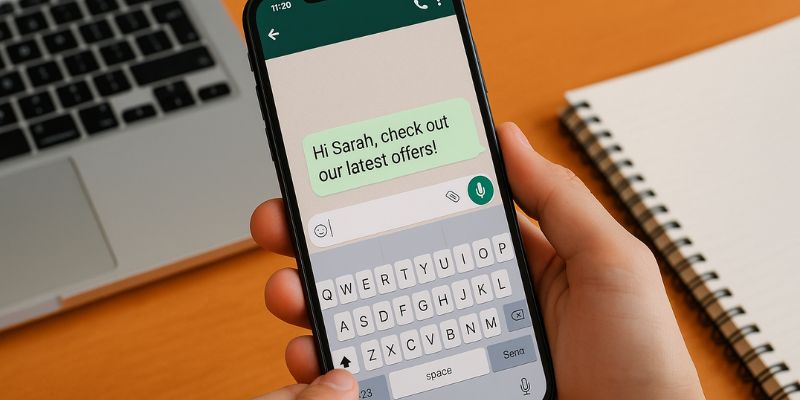How to Personalize Marketing Messages on WhatsApp
In the digital age, personalizing marketing messages is crucial to engaging customers effectively. WhatsApp, with its vast global user base, presents a unique opportunity for businesses to reach their audiences in a personal and direct manner. In this article, we will explore various strategies to personalize marketing messages on WhatsApp, enhancing customer engagement and driving business success.
Understanding the Importance of Personalization
Personalization in marketing is not just a trend but a necessity. By tailoring messages to individual preferences and behaviors, businesses can create a more meaningful connection with their customers. This leads to higher engagement rates, increased brand loyalty, and ultimately, better conversion rates. On WhatsApp, personalization can be achieved through various tactics, from using the recipient’s name to tailoring offers based on previous interactions.
Leveraging Customer Data for Personalized Messaging
To personalize messages effectively, businesses must leverage customer data. This data can be collected through various channels such as website visits, purchase history, and social media interactions. By analyzing this data, businesses can gain insights into customer preferences and behaviors, allowing them to craft messages that resonate with their audience.
- Collecting Data: Use forms, surveys, and website analytics to gather relevant customer information.
- Analyzing Data: Employ data analytics tools to interpret customer data and identify trends and patterns.
- Implementing Insights: Use the insights gained to tailor your WhatsApp messages to match customer interests and needs.
Creating Personalized Content for WhatsApp
Content is king, and when it comes to WhatsApp marketing, personalized content reigns supreme. Whether it’s a text message, image, or video, the content should be relevant and engaging to the recipient.
- Text Messages: Use the recipient’s name and reference previous interactions to make the message feel personal.
- Images and Videos: Create visually appealing content that aligns with the recipient’s interests.
- Offers and Promotions: Tailor offers based on the recipient’s past purchases or browsing behavior.
Using Automation for Personalization
Automation can greatly enhance your ability to deliver personalized messages on WhatsApp. With the right tools, businesses can automate the sending of personalized messages based on triggers such as a customer’s birthday or a recent purchase.
- Chatbots: Use chatbots to provide instant, personalized responses to customer inquiries.
- Automated Campaigns: Set up automated campaigns that send personalized messages based on customer behavior.
- Segmentation: Segment your audience into groups with similar characteristics to ensure messages are relevant and targeted.
Measuring the Impact of Personalized Messages
Once you have implemented personalized messaging strategies on WhatsApp, it is essential to measure their impact. This will help you understand what works and what doesn’t, allowing you to refine your approach and improve results.
- Engagement Rates: Track open and response rates to gauge engagement levels.
- Conversion Rates: Monitor the percentage of recipients who take a desired action after receiving a message.
- Customer Feedback: Solicit feedback from customers to gain insights into their experience and satisfaction.
Ensuring Privacy and Compliance
While personalization is important, it is equally crucial to respect customer privacy and comply with regulations such as the GDPR. Ensure that you have consent to use customer data and that your messages comply with legal requirements.
- Consent Management: Obtain explicit consent from customers to use their data for marketing purposes.
- Data Protection: Implement robust data protection measures to safeguard customer information.
- Compliance Checks: Regularly review your messaging practices to ensure compliance with applicable regulations.
Conclusion
Personalizing marketing messages on WhatsApp is a powerful strategy to engage customers and drive business success. By leveraging customer data, creating personalized content, using automation, and ensuring privacy, businesses can craft messages that resonate with their audience and achieve their marketing goals. As the digital landscape continues to evolve, personalization will remain a key factor in successful marketing campaigns.
FAQs
How can I collect customer data for personalization?
Customer data can be collected through forms, surveys, website analytics, and social media interactions. This data provides valuable insights into customer preferences and behaviors.
What tools can help automate personalized messaging on WhatsApp?
Tools like chatbots, CRM systems, and marketing automation platforms can help automate personalized messaging, making it easier to deliver timely and relevant messages to your audience.
How do I ensure my personalized messages comply with privacy regulations?
Ensure compliance by obtaining explicit consent from customers, implementing data protection measures, and regularly reviewing your messaging practices to align with legal requirements.
What metrics should I track to measure the impact of personalized messages?
Key metrics include engagement rates, conversion rates, and customer feedback, which provide insights into the effectiveness of your personalized messaging strategy.
Why is personalization important in WhatsApp marketing?
Personalization is important because it helps create a meaningful connection with customers, leading to higher engagement, increased brand loyalty, and improved conversion rates.
Can small businesses benefit from personalized WhatsApp marketing?
Yes, small businesses can benefit significantly from personalized marketing on WhatsApp by building stronger relationships with customers and standing out in a competitive market.
How can I segment my audience for personalized messaging?
Segment your audience based on factors like demographics, purchase history, and engagement levels to ensure messages are relevant and targeted to each group.
What are some examples of personalized content on WhatsApp?
Examples include using the recipient’s name in messages, tailoring offers based on past purchases, and sending personalized birthday messages or reminders.
How often should I send personalized messages on WhatsApp?
The frequency of personalized messages depends on your audience and campaign goals, but it’s important to maintain a balance to avoid overwhelming recipients.
What are the risks of not personalizing WhatsApp marketing messages?
Without personalization, messages may feel generic and impersonal, leading to lower engagement rates, decreased customer satisfaction, and missed opportunities for conversion.
